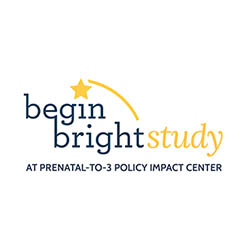Founded by the National Academy of Sciences in 1933 as a multidisciplinary, not-for-profit, professional association, the Society for Research in Child Development (SRCD) has a membership of approximately 5,500 researchers, practitioners, and human development professionals from 60 countries. The mission of SRCD is to advance developmental science and promote its use to improve human lives.
SRCD’s Biennial Meeting is taking place virtually April 7 – April 9, 2021, bringing together thousands of developmental scientists from around the world to present and learn about the latest research in child development.
Dr. Cynthia Osborne, Prenatal-to-3 Policy Impact Center director and LBJ School of Public Affairs Associate Dean at The University of Texas at Austin, will be joining her esteemed colleagues on April 8th for a special roundtable discussion about the new American Rescue Plan and its benefits for children. Session details below.
Subscribe for email updates from the Prenatal-to-3 Policy Impact Center here.
Special Conversation: The New U.S. Presidential Administration’s Early Childhood Education Policy
SRCD Biennial Meeting | Thursday, April 8, 7:30 to 8:30pm EDT (6:30 to 7:30pm CDT), Virtual
- Dr. Kenneth A. Dodge (moderator) – SRCD President, Distinguished Professor of Public Policy Studies at Duke University Sanford School of Public Policy, and Founder of Family Connects International
- Dr. Ajay Chaudry – Research Scholar at New York University’s Institute for Human Development and Social Change and Robert F. Wagner Graduate School of Public Services
- Dr. Linda Darling-Hammond – CEO of the Learning Policy Institute and Professor Education Emeritus at Stanford University
- Dr. John B. King, Jr. – President and CEO of The Education Trust and Former U.S. Secretary of Education
- Dr. Cynthia Osborne – Associate Dean of The University of Texas at Austin LBJ School of Public Affairs, Director of the Child and Family Research Partnership and the Prenatal-to-3 Policy Impact Center
Official conference press release:
WASHINGTON, April 1, 2021 /PRNewswire/ — The Society for Research in Child Development will hold its Biennial Meeting virtually April 7 – April 9, 2021. The meeting brings together thousands of developmental scientists from around the world to present and learn about the latest research in child development. Attendance is complimentary to members of the media.
Researchers will consider:
- How has the Covid-19 pandemic altered screen use in children?
- How can scholars promote social justice in developmental science?
- How does sexual orientation shape family lives?
- How and why does culture influence adolescent development?
Other highlights include:
- Lieutenant Governor of Minnesota, Peggy Flanagan, on the role of state government in supporting families and children and recovery from the Covid-19 pandemic.
- Address by SRCD President and Duke University’s Dr. Kenneth A. Dodge on how to grow opportunities and eliminate disparities for young children and their families.
- An international line-up of speakers from the United Kingdom, Spain, China, Greece and Norway.
- A roundtable discussion on President Biden’s American Rescue plan and its Benefits for Children, featuring Cynthia Osborne, Director, Child and Family Partnership, University of Texas, John B. King, Jr., former U.S. Secretary of Education and CEO, Education Trust Linda Darling-Hammond, CEO, Learning Policy Institute and Professor Emeritus, Stanford University and Ajay Chaudry, New York University.
- Invited talks from prestigious award winners, including:
- Dr. Michael P. Milham, vice president of research at the Child Mind Institute and recipient of the Open Science Award from the Organization for Human Brain Mapping
- Damien Fair, cognitive neuroscientist and 2020 MacArthur Fellow
- The release of a new editorial vision for the field’s leading journal, Child Development from Editor-in-Chief, Dr. Glenn I. Roisman (University of Minnesota), and
- More than forty simultaneous sessions on salient child development topics from cognitive development to the effects of xenophobia on immigrants.



